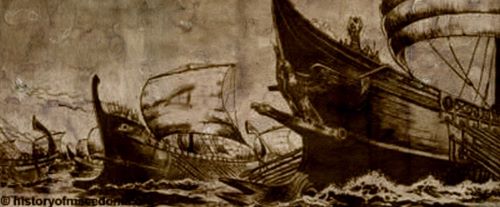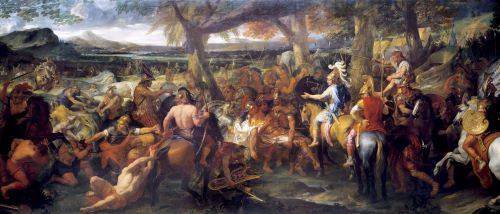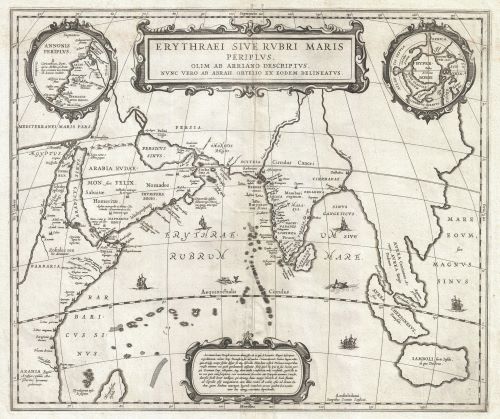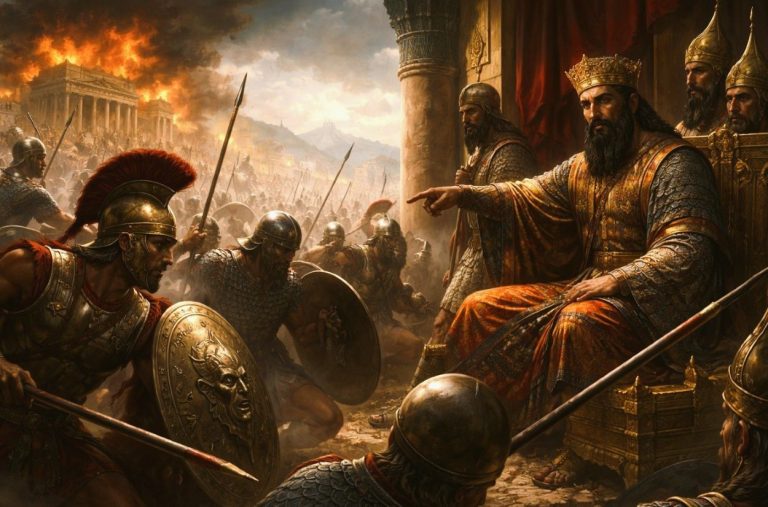

Alexander’s aim to reach the edges of the world and find the Ocean had a key impact in ancient Greek geography.

By Dr. Francisco Javier Gómez Espelosín
Professor of History and Philosophy
Universidad de Alcalá
Alexander quite probably had in mind the idea of reaching the Ocean, which in the Greek geographical mentality at the beginning of the Eastern Expedition was believed to mark the end of all the inhabited lands in all four directions.1 He surely shared the Greeks’ general image of the world, transmitted above all from epic poetry, and he also knew that the territories of the Persian Empire extended to the confines of Asia, specifically to India, something that was already known from the time of Herodotus and quite possibly earlier in times of Hecateus.2 It is equally possible that this view was also influenced by Aristotle’s image of Asia as a space divided longitudinally by a long mountain range that culminated in the east in the great sea that surrounded the entire ecumene.3
However, we unfortunately have no first-hand knowledge of Alexander’s personal geographical conceptions and it is tremendously difficult to extract them from the tangled web of testimonies that we have available due to the conceptual and ideological stratification that characterises the whole tradition4. Likewise, we certainly know very little about the specific relationships between master and disciple and, furthermore, the role of geography within Aristotelian literature practically amounts to nothing more
han a few passages of the Meteorologiká.5 In any event, it seems clear that the idea of Asia at that time roughly equated with the dominions of the Achaemenid Empire, which stretched from the shores of the Aegean to India, so any pretence of conquest in that direction implied the possibility of reaching such extremes at any given moment, with all the connotations associated to that territory in the Greek geographical imagination.6
The conquest of India was indeed one of Alexander’s priority objectives, at least from a certain stage during the campaign. This is what he says to Pharasmanes, King of the Chorasmians, who had come to offer his help in the conquest of the lands that ranged from his dominions in Central Asia to the shores of the Black Sea, which they imagined to be much closer than they were really were.7 Alexander rejected the proposal with an impeccably diplomatic tone, asking Pharasmanes to deal for the moment with the Satraps neighbouring his kingdom, and invited him to leave the aforesaid plan for a later stage, once he had achieved his main objective of conquering India and hence become the outright commander of the whole Asian continent.8 He possibly even then still hoped to reach the ocean to the east after conquering India.

However, as he advanced into India, Alexander acquired enough information to discard the idea that the Indus was the source of the Nile, as he had originally supposed, since the great river gathered the waters of all its tributaries and flowed south to meet the ocean.9 In fact, he ordered the construction of a fleet on the Hydaspes in order to sail in that direction once he had completed his campaign in eastern India.10 Nevertheless, Alexander did not give up on his idea of trying to reach the Ocean via the east as well, and continued advancing to the Hyphasis with the idea of crossing the river and moving onwards. But the reports that he gathered locally were rather foreboding, since they spoke of a desert crossing to reach a great river, greater than the Indus, on the other side of which lay the dominions of a powerful kingdom that had a huge army and a large contingent of elephants that far exceeded anything they had faced so far.11 These reports did not include a single mention of the presence of Ocean anywhere near to the other bank, but spoke instead of the need for new campaigns against a powerful enemy. Alexander himself, surely downhearted in his expectations, sought to confirm this information with his new ally, King Porus, who corroborated all these inauspicious prospects.12 The Macedonians refused to continue and Alexander tried to persuade them, still holding the false idea about the eastern extension of India and the possibility of reaching the ocean on that side of the globe, as predicted by the Aristotelian worldview, which he too had probably come to doubt.13 Finally, his men’s stubborn refusal meant he had no choice other than to desist and he ordered his troops to return.14 In any case, Alexander felt that he had reached a boundary, which he demonstrated by ordering an altar to be built to the godson the riverbank. Ultimately, and viewed from the perspective of the king’s outward image, it was the stubbornness of his troops and the discouraging omens that prevented him from making the crossing.15
The only way to reach the ocean was therefore to follow the course of the Indus to the south, as he had originally planned, and in fact he made sacrifices to Ocean on departure from the Hydaspes.16 So, the expedition diverted its return path to the south without any indication of protest from his troops, who had clearly expressed their desire to return to the homeland.17 The route was a long and arduous one, plagued by fierce confrontations with the natives,18 but Alexander finally managed to reach the ocean shores, contemplating with his men what an amazing place it was and admiring such phenomena as tides, which they had never witnessed before.19
Alexander took the necessary actions to ensure that he had indeed achieved his goal. He conducted a thorough survey of the different mouths of the delta that flowed into the sea, located two islands and sailed a stretch of the high seas in order to confirm that there was no other land in the vicinity.20 Once he was convinced of this, he made spectacular sacrifices to Poseidon, with bulls and libations in golden cups that were then tossed into the sea. Certain parallelisms have been made with the ritual ceremonies that he performed at the beginning of the expedition at the Strait of Hellespont, which was a way of marking the beginning and the end of the campaign in the sense that the furthest point he had reached marked the far boundary of the ecumene. According to Diodorus, Alexander would have thus understood that the expedition had reached its end and hence he raised altars in honour of Tethys and the Ocean.21 If we heed Plutarch’s account, then Alexander even prayed to the gods, asking them to allow nobody else to cross the boundaries that he had reached on his expedition.22
Symbolic and ideological actions were undoubtedly important both in the monarch’s own conscience and in the collective mind-set of the other members of the expedition.
Judging by its legacy in literary tradition,23 albeit much later, the feat of having reached the waters of the ocean was deliberately exploited from this perspective. His presence in the waters of the Ocean ensured Alexander’s place in the heroic annals that defined a good part of his actions whereby he constantly emulated and surpassed his referential paradigms. Like Heracles, he had reached a point from which it was impossible to sail any further and he had surpassed Dionysus in his conquests. The oceanic confines of the world, to which only heroes had access, were now also part of the Macedonian conqueror’s exploits, who could now also inscribe his name in the landscape of those remote lands in the form of constructions and foundations at the mouth of the river, and the altars in honour of Tethys and Ocean that Diodorus mentions.24

However, once again, Arrian highlights the more pragmatic dimension of Alexander’s explorations, such as surveying of the area as the starting point for Nearchus’ expedition through the waters of the Indian Ocean and the possibilities for its exploitation with a view to dominion and control of the territory and possible trade routes.25 Alexander never neglected the logistical and strategic aspects despite the symbolic connotations surrounding the events, as occurred in the Indian city of Nysa, where ‘Dionysian’ expectations did not prevent him from heeding more pragmatic deeds such as the delivery of hostages and the presence of a garrison.26
But his arrival at the Ocean also entailed another class of ideological dimensions that were related to total domination of Asia and surpassing all of his predecessors in this area, such as the great eastern monarchs Semiramis, Cyrus and Darius I himself, who despite their great conquests were never able to achieve such a goal. It is certainly significant that in all accounts of Alexander’s campaign there is not a single echo of Scylax of Caryanda’s expedition along the Indus and later along the ocean coasts, undertaken in the late 6thcentury BC under the orders of Darius I. Alexander must have been relatively aware of the universalist vocation that the Persian monarchs proclaimed in their royal inscriptions27 and surely found in them a new motivation to realise and surpass such pretensions. From the Greco-Macedonian point of view, the relationship between the Persian monarchs and the Ocean seemed rather distant despite all their proclamations and in fact they attributed the construction of dams on the Tigris to fear of an invasion from the sea. Alexander later ordered the destruction of those dams with the idea of turning the rivers into a link to the seas, which now did appear to be controlled by the same power.28 Not long before, he had sailed the same route along the Eulaios from Susa with the intention of exploring and controlling the different waterways that connected to the sea29 and it was surely after Nearchus’ trip when the Macedonian monarch’s ultimate plans for conquest were defined. Arrival at the ocean had proved that the Eritrean Sea was not an enclosed space that connected India and Ethiopia, but was a route that could be used to entertain the ambition of much grander designs for conquest and colonisation, thus interconnecting the different gulfs of the ocean.30 Curiously, Alexander ordered a series of expeditions that were all related in some way to the oceanic question, such as that of Heracleides towards the Caspian in order to understand once and for all the true nature of that sea, and whether India and the Persian Gulf were indeed connected by sea,31 or those of Archias, Androsthenes and Hiero towards the coasts of Arabia, as part of a plan for conquest that he was still preparing at the time of his death, given the pivotal role of that peninsula in the geographical layout of Asia and Libya and in all likelihood the continuation of the ocean to the south to enable circumvallation of the last continent.32
The idea of the seas the final boundary of aspirations for conquest has commonly been attributed to the propaganda of the Roman imperial ideology, but it had already been well-established in all the eastern empires as reflected in their commemorative and triumphal inscriptions.33 Alexander perhaps incorporated these aspirations in his ecumenical pretensions that implied both the heroic perception of his conquests, within the Greco-Macedonian perspective, and the dominion of Asia, whose boundaries were necessarily marked by the sea. Doubts concerning the real status of the Caspian Sea together with his relatively fleeting passage through the region, uncertainties about the nature of the Eritrean Sea, which bordered the Achaemenid dominions to the south, along with the urgent need to embark on a conquest of the great Persian capitals and the persecution of Darius III, and the practical impossibility of reaching the eastern ocean, which was much more unknown since there was practically no information other than the purely theoretical presumption of its existence, made Alexander’s arrival at the Indian Ocean a truly memorable event that was full of all kinds of symbolic connotations. It clearly signified the end of the expedition since it was in fact from there that the real return journey began. Nearchus’ voyage was considered a truly pioneering feat through unknown waters, even though the journey had been made beforehand by another Greek navigator, hence the existence of any precedent needed to be ignored. Alexander also acquired the heroic status of having reached the ends of the earth, overcoming all kinds of obstacle to do so, including the ultimate barrier, the Ocean, and thus confirming his absorbing sense of invincibility, which seemed to also be endorsed by divine auspices and omens. The discovery of ocean waters and the viability of links with the Persian Gulf also generated great expectations in terms of the political and economic control of all the neighbouring territories. All these factors could very well have raised much more ambitious expectations of the conquests extending to all corners of the world, thereby also reaching the very ends of the oceans. However, Alexander’s unexpected death, the fragility of his succession and the conflict of interests and ambitions that was unleashed by his passing mean we shall never know how far those plans could really have gone, for they were rejected by his successors and converted by later speculation and propaganda into a demonstration of designs for universal conquest that only materialised in legend and fiction. Real or imagined, such aspirations ultimately fit well with a man who seemed to have made the Ocean, both in its mythical and ideological sense, and also in its purely geographical one, with all its political and economic derivations, the definitive goal of his conquests.
(See endnotes and bibliography at source).
Originally published by Karanos: Bulleting of Ancient Macedonian Studies 4 (2021, 91-97) under the terms of a Creative Commons Attribution 4.0 International license.


